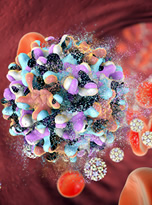Read and report vaccine reactions, harassment and failures.
Can Hepatitis B be prevented and are there treatment options?

For most adults, acute hepatitis B does not cause any long-term health issues. Many who are infected are asymptomatic or experience mild flu-like symptoms and fatigue. For those who have an acute hepatitis B infection, treatment options involve rest and hydration. Hospitalization is rare unless severe dehydration from nausea and vomiting occur. Rarely, acute hepatitis B infections can cause acute liver failure (fulminant hepatic failure), and treatment options involve admission to hospital intensive care and a liver transplant.
Less than five percent of adults affected with acute hepatitis B will go on to develop chronic hepatitis B infection. Infants and children infected with acute hepatitis B are often asymptomatic; however, a higher percentage of children with acute hepatitis B will develop chronic hepatitis B infections.
There are several ways to prevent hepatitis B infections. The best option for prevention of hepatitis B in infants involves pre-natal screening of all pregnant women for hepatitis B and immediate perinatal care of the infant with immunoglobulins and vaccination if the mother is hepatitis B positive.
For adults, prevention of hepatitis B infection involves safer sex practices (screening of sex partners, use of condoms) and stopping the use of illegal drugs. It is also advisable to ensure any tattoo and piercing business are reputable and use sterile equipment. Health care workers can prevent hepatitis B infection by practicing universal precautions (gowns, masks, caution with needles) to minimize the risk of infection.
Treatment options for chronic hepatitis B include antiviral medication, Interferon alfa-2b and a liver transplant.
IMPORTANT NOTE: NVIC encourages you to become fully informed about Hepatitis B and the Hepatitis B vaccine by reading all sections in the Table of Contents , which contain many links and resources such as the manufacturer product information inserts, and to speak with one or more trusted health care professionals before making a vaccination decision for yourself or your child. This information is for educational purposes only and is not intended as medical advice.



